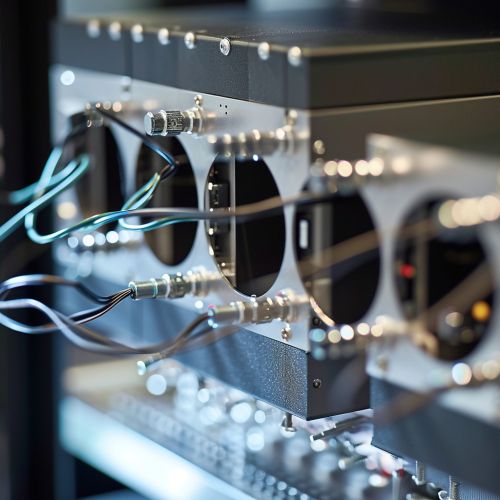Cavity filter
Introduction
A Cavity filter is a type of electronic filter used in the telecommunications industry. These filters are primarily utilized in applications where high performance is required, particularly in the areas of selectivity and out-of-band rejection. Cavity filters are typically constructed from a series of resonant cavities, each tuned to a specific frequency.


Design and Operation
The design of a cavity filter is based on the principles of resonant circuits. These circuits, which consist of an inductor and a capacitor, are designed to resonate at a specific frequency. In the case of a cavity filter, the resonant circuits are replaced by resonant cavities. Each cavity is designed to resonate at a specific frequency, allowing it to selectively pass or reject signals at that frequency.
The operation of a cavity filter is based on the principle of wave interference. When a signal enters the filter, it is divided into multiple paths, each passing through a different resonant cavity. The signals in each path are then recombined at the output of the filter. If the signals in each path are in phase, they will add constructively, resulting in a high output signal. If the signals are out of phase, they will add destructively, resulting in a low output signal. This allows the filter to selectively pass or reject signals based on their frequency.
Types of Cavity Filters
There are several types of cavity filters, each with its own unique characteristics and applications. These include:
- Bandpass Cavity Filters: These filters are designed to pass signals within a specific frequency band while rejecting signals outside of this band. They are commonly used in wireless communication systems to isolate specific frequency bands for transmission or reception.
- Notch Cavity Filters: These filters are designed to reject signals within a specific frequency band while passing signals outside of this band. They are commonly used in radar systems to eliminate interference from specific frequency sources.
- Low-Pass Cavity Filters: These filters are designed to pass signals below a specific cutoff frequency while rejecting signals above this frequency. They are commonly used in RF power amplifiers to prevent harmonic distortion.
- High-Pass Cavity Filters: These filters are designed to pass signals above a specific cutoff frequency while rejecting signals below this frequency. They are commonly used in microwave communication systems to eliminate low-frequency noise.
Applications
Cavity filters are used in a wide range of applications in the telecommunications industry. These include:
- Wireless Communication Systems: Cavity filters are used in wireless communication systems to isolate specific frequency bands for transmission or reception. This allows multiple signals to be transmitted or received simultaneously without interference.
- Radar Systems: Cavity filters are used in radar systems to eliminate interference from specific frequency sources. This allows the radar system to accurately detect and track targets.
- Satellite Communication Systems: Cavity filters are used in satellite communication systems to filter out unwanted signals and noise. This allows the satellite to receive and transmit signals with high clarity and reliability.
- Radio Astronomy: Cavity filters are used in radio astronomy to isolate specific frequency bands for observation. This allows astronomers to study celestial objects and phenomena in specific frequency ranges.
Advantages and Disadvantages
Like all electronic components, cavity filters have both advantages and disadvantages. These include:
- Advantages: Cavity filters offer high performance in terms of selectivity and out-of-band rejection. They are also highly reliable and durable, making them suitable for use in harsh environments.
- Disadvantages: Cavity filters are typically larger and more expensive than other types of filters. They also require careful tuning to achieve optimal performance.
